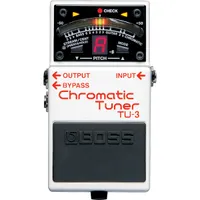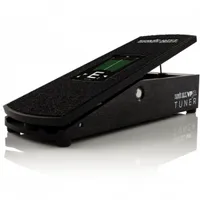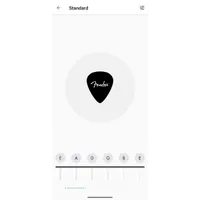Best guitar tuners 2026: clip-on, pedal, and app-based tuning options for all guitarists
Nail your tuning with our selection of tuners for guitar, bass, and more from the likes of TC Electronic, Boss, Korg, and D’Addario
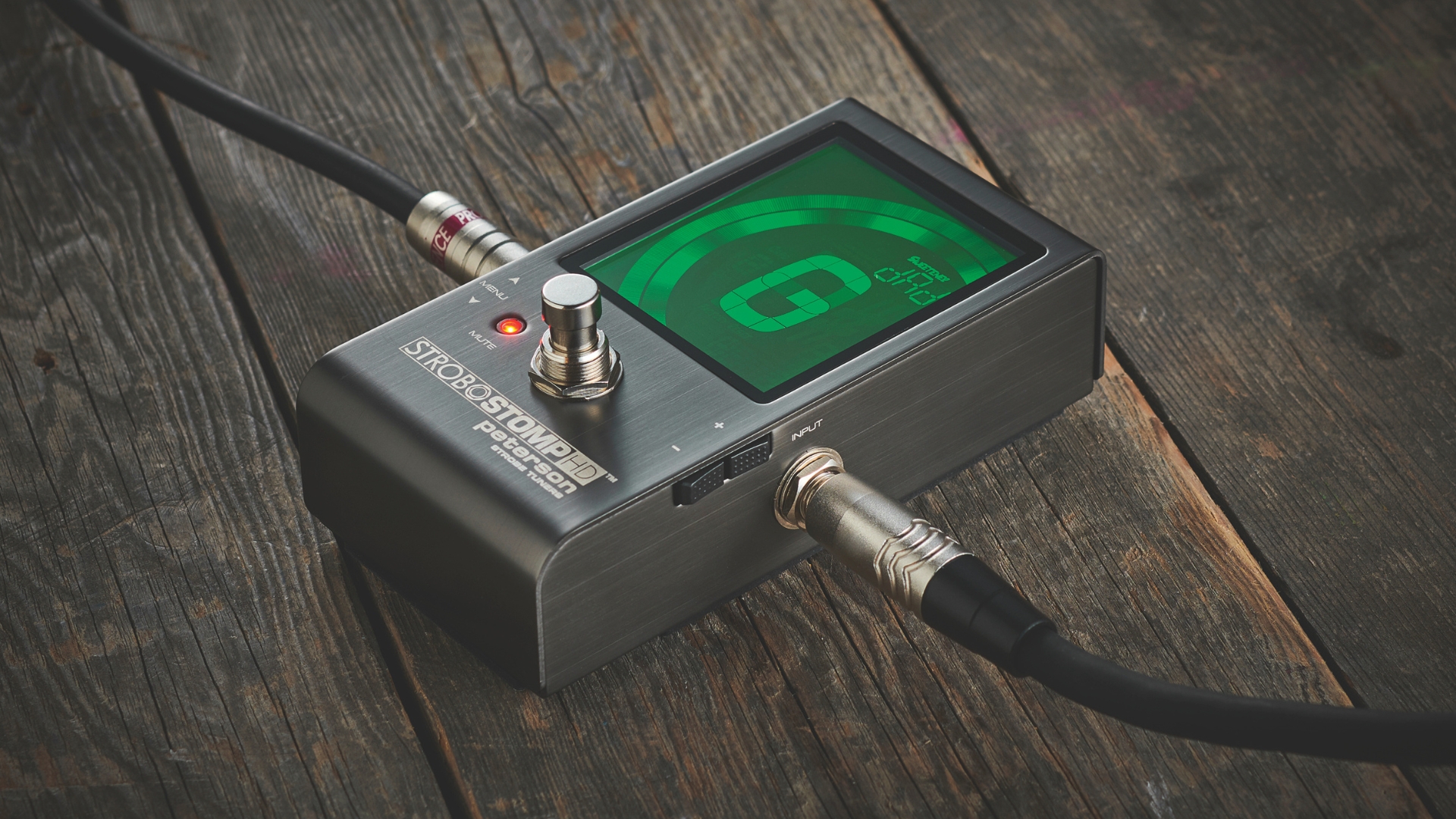
All the latest guitar news, interviews, lessons, reviews, deals and more, direct to your inbox!
You are now subscribed
Your newsletter sign-up was successful
Whether they conjure the level of excitement that a new guitar, amplifier, or effects pedal does isn’t really a debate – for most, they won’t – but the importance of having one of the best tuners as part of your rig cannot be understated. Without the right tuner, it doesn’t matter how good your setup is, because everything will sound bad if you’re out of tune.
I’ve used plenty of tuners over the years, from pedal tuners and clip-ons to just about every tuner app available on the app store. Many have been excellent. Some have been temperamental. Others I wouldn’t go near again. The tuners I find myself consistently returning to provide accurate and easy tuning for your guitar, allowing you to quickly adjust your tuning pegs to the correct position to put your guitar perfectly in tune in only a few moments. On top of that, they’re easy to see and understand, too, particularly for playing live, where making changes rapidly between songs is integral.
If you want the best guitar tuner overall, I’d go for the TC Electronic PolyTune 3 Mini, which will give you superb tuning accuracy in a package that doesn’t take up too much space, which means room for more exciting pedals! If you’re an acoustic player or prefer a clip-on to use on multiple guitars at home, the D’Addario NS Micro would be my go-to, delivering excellent performance with a compact and lightweight design.
I’ve made sure that there’s something for everybody, regardless of your budget, and if you want some help to decide, you can visit the how to choose section, where I’ve tried to point you in the right direction for your needs, and the FAQ section, where I’ve answered the common questions people have with tuners. If you find any lingo you don’t understand throughout, I’ve also put a glossary of key terms at the end to get you up to speed.
My top picks
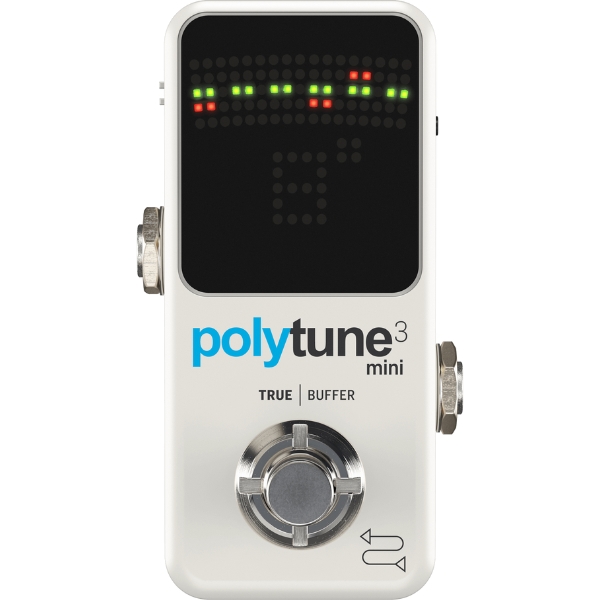
It's small enough to fit on any pedalboard whilst still packing in the features and functionality of a full-size tuner pedal. It just doesn't get much better than the TC Electronic PolyTune 3 Mini.
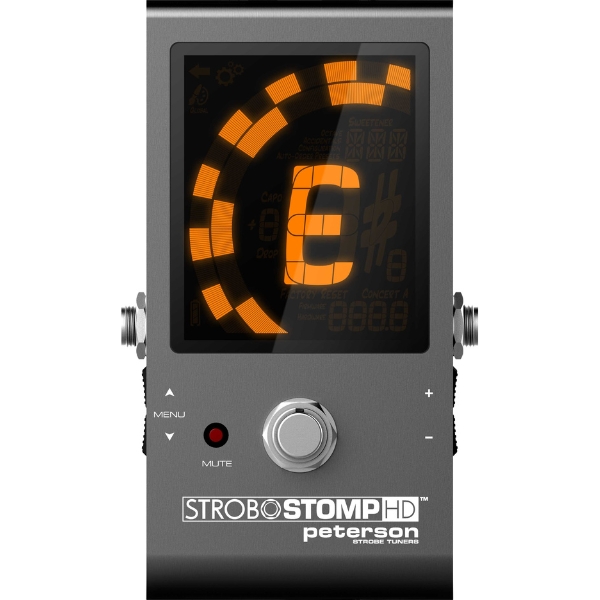
Well renowned for being amongst the most precise tuner pedals, the Peterson StroboStomp HD packs loads of features, 'sweetened tunings', and is accurate to 0.1 cents.
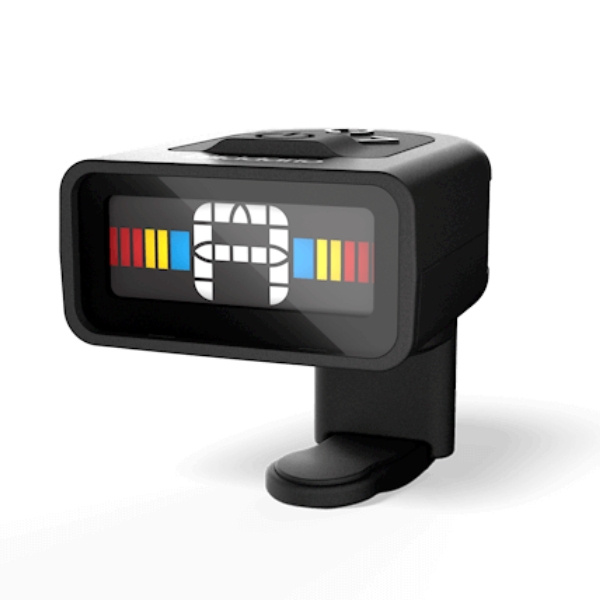
If you want something small and discreet, or you've already got too many pedals on your 'board, the D'Addario NS Micro Tuner will fit seamlessly into your existing setup with zero fuss.
Best overall
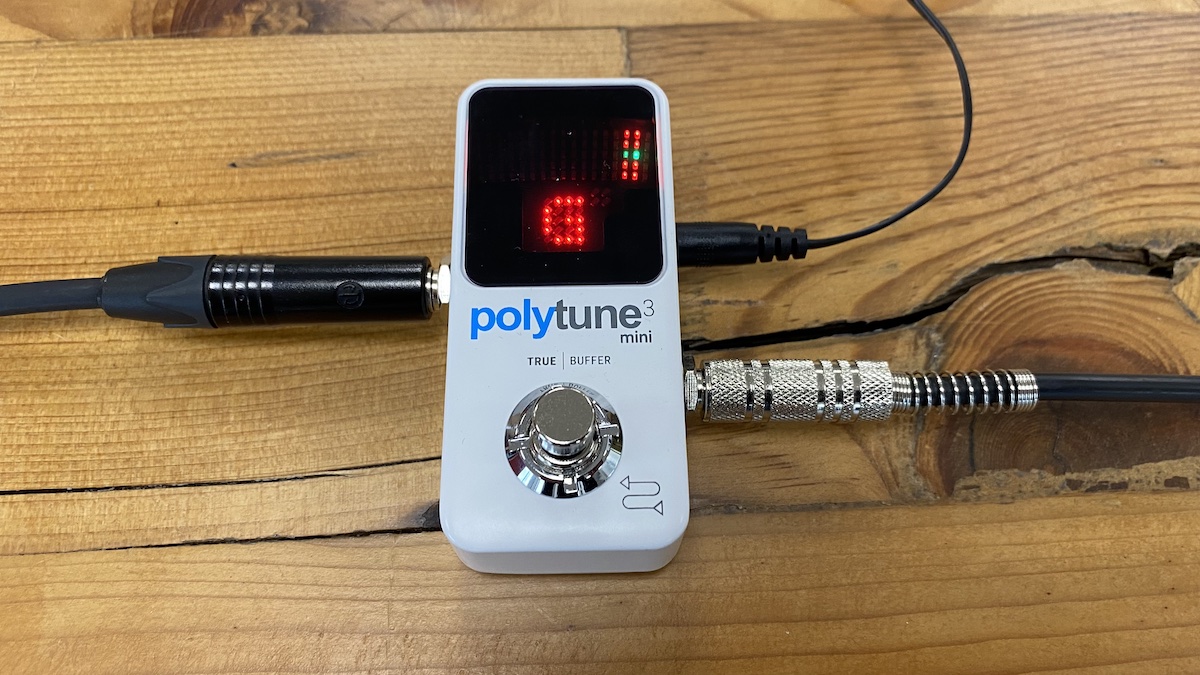
1. TC Electronic PolyTune 3 Mini
Our expert review:
Specifications
Reasons to buy
Reasons to avoid
🎸 If you want exceptional tuning performance in a compact, pedalboard-mountable package, the TC PolyTune 3 Mini is the guitar tuner for you. It'll suit pretty much every kind of guitar player out there.
✅ Buy if you need a tuner with pinpoint accuracy: The Polytune 3 Mini in strobe mode is our list’s most accurate.
❌ Avoid if you have particularly big feet: Both the chassis and footswitch are particularly small and may cause issues for big feet.
Overview: If you are after a tuner pedal that is small, compact, and doesn’t take up too much valuable pedalboard real estate, then the TC Electronic PolyTune 3 Mini could be just what you need. Obviously, being small isn’t all this PolyTune 3 Mini is good for; it is super accurate, has plenty of modes, and a brilliantly bright screen.
Build Quality: Like its bigger sibling, the PolyTune 3 Mini is built to an exceptional standard. The metal chassis is solid, and the footswitch has a smooth and reassuring click. Although in the ‘affordable’ category, TC Electronic has not cut corners, and the Mini will easily stand up to the rigors of the road.
Features: One of PolyTune’s biggest selling points is its polyphonic functionality. Strum the strings, and you’ll see which are ringing true and which are out – and the rest is easy. The 109 LEDs installed into the miniature display offer a crisp, bright image, and make using this tuner a pain- and stress-free occasion.
The PT 3 Mini also has an ‘always on’ feature, which is brilliantly convenient for those who play slide or fretless guitars. If you are someone who enjoys a smooth, emotive string bend mixed into their playing, you will also love this setting, and with both buffered and true bypass modes on offer too, you are bound to find a spot for the PolyTune 3 Mini in your signal chain.
Accuray/Performance: In strobe mode, the PolyTune 3 Mini is the joint most accurate tuner on our list. If you are laying down a track in the studio or have particular bandmates, this is the tuner for you. Not only that, but this tuner tracks your note with great detail and response; it truly is a top performer in every category.
Best accuracy
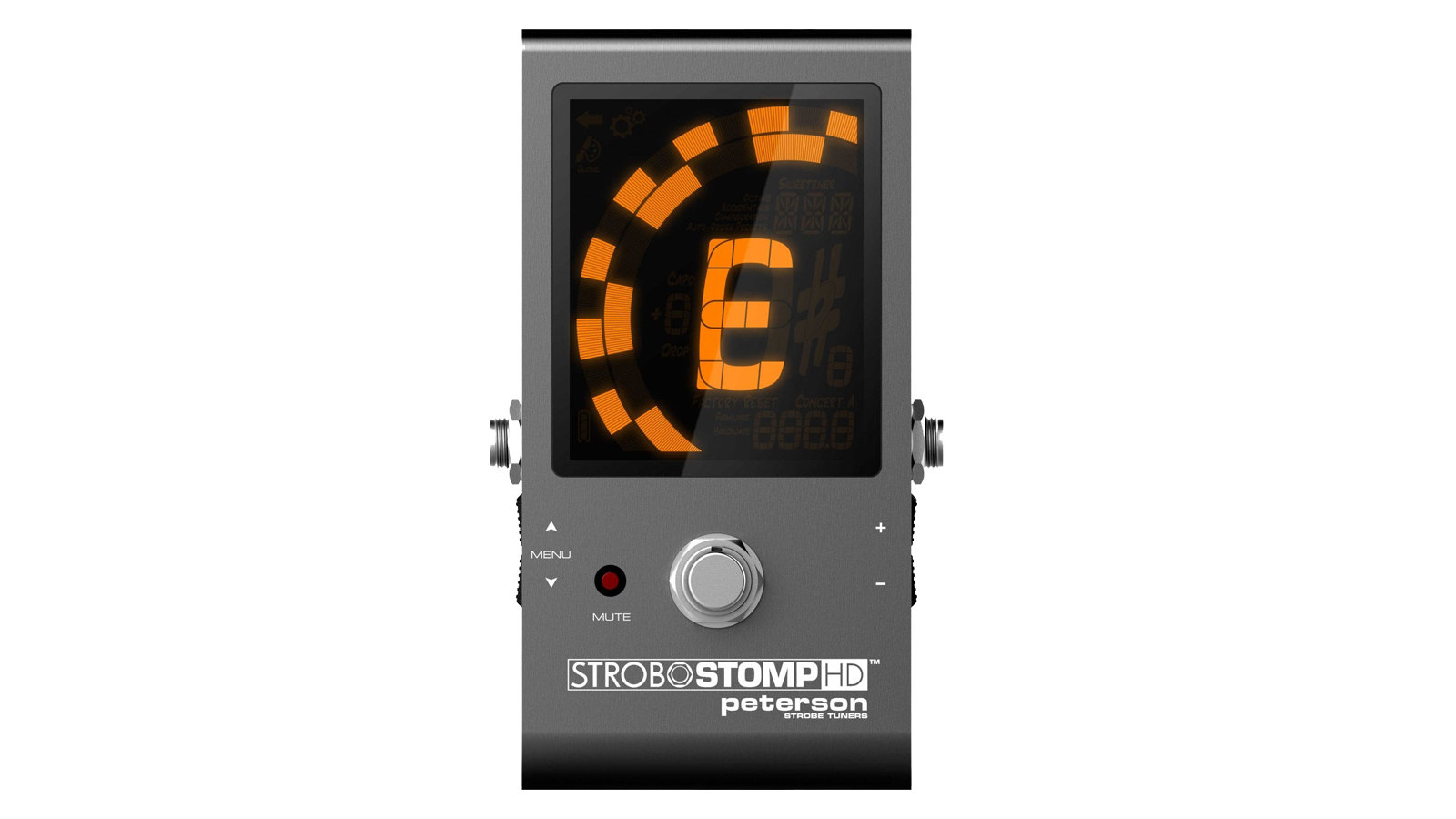
2. Peterson StroboStomp HD
Our expert review:
Specifications
Reasons to buy
Reasons to avoid
🎸 If you're the sort who can hear if a guitar is a couple of cents out of tune, the StroboStomp HD is the guitar tuner of your dreams. Ideal for touring-level players and recording artists.
✅ Buy if you have a huge guitar collection. The sweetened tunings will work great with multiple guitars for nailing the quirks.
❌ Avoid if you don’t like strobe mode: There is no alternative with this tuner; it is strobe or nothing.
Overview: Peterson tuner pedals are renowned for being some of the best in the business. They are highly famed for their accuracy, as well as virtually bulletproof build quality, with some considering the StroboStomp HD to be ‘the ultimate pedal guitar tuner’.
Build Quality: Firstly, when you take the Stomp out of its packaging, you will realize its heft. The stainless steel construction is reassuringly rugged, and Peterson has designed this pedal with heavy stomps in mind. Although it doesn’t bother me, I know that some don’t appreciate side-mounted jacks, which this tuner utilizes.
Features: With a set of features that far outweigh those of its rivals, you will find vast swathes of different tuning modes, ‘sweetened’ tunings, and presets that make tuning changes at shows much easier. Although ‘sweetened’ tunings aren’t a common occurrence when it comes to other tuners, this functionality allows for micro-adjusted reference points that are optimized for a variety of stringed instruments. The ability to save presets is another great selling point of the StroboStomp HD, helping to make this tuner pedal one of our all-time favorites.
Accuracy/Performance: The level of tweaking that the StroboStomp HD allows is best suited to those like us who appreciate the nerdiest, most in-depth levels of tweaking, and for that, we’re truly grateful. The StroboStomp HD is accurate to 0.1 cents, too, which is plenty accurate for even the most sensitive of ears.
Best compact tuner
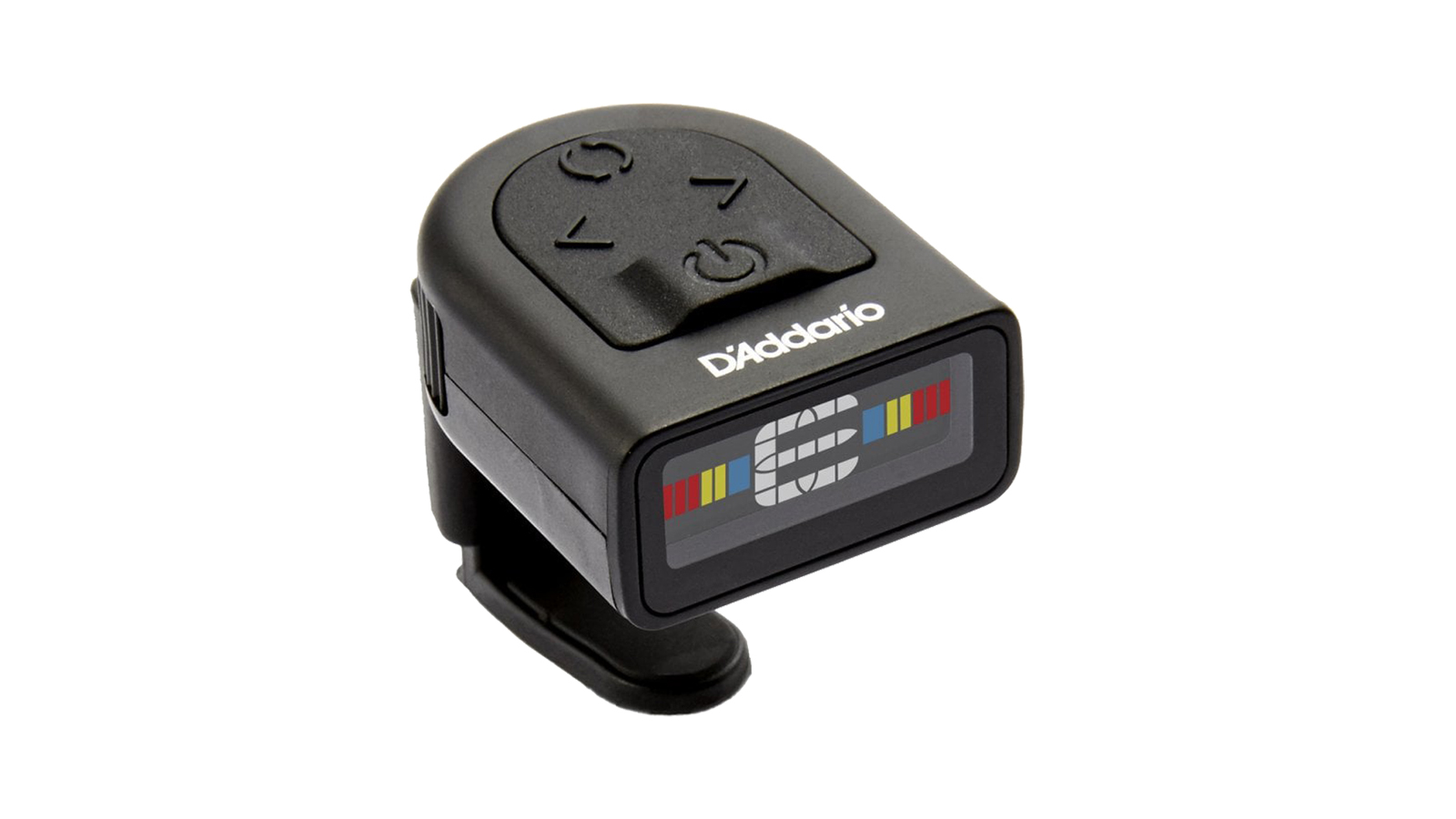
3. D’Addario NS Micro Tuner
Our expert review:
Specifications
Reasons to buy
Reasons to avoid
🎸 The NS Micro is ideal for acoustic guitars and playing at home, thanks to its small size and discreet design.
✅ Buy if you want your clip-on tuner to be discreet: D’Addario has made this small and compact so it goes undetected.
❌ Avoid if you easily misplace things: This tuner is tiny. If you are prone to losing guitar accessories, maybe this isn’t for you.
Overview: Headstock tuners rarely get smaller than the NS Micro Tuner by D’Addario. As the name suggests, it is very small, but it is a powerful little thing, nonetheless. If you don’t want anybody to detect your clip-on tuner, then this is the perfect choice for you.
Build Quality: Let’s start with the build quality. The all-plastic casing is not the most durable on our list. Dropping it from a height should not cause too many breakages, but you will certainly not want to stand on it whilst on stage. However, the clamp has a reassuring strength and is unlikely to come off whilst playing, so there is that.
Features: Then, onto features, and the NS Micro doesn’t sacrifice usability for its smaller footprint. It has got a bright, easy-to-read and easily adjustable screen which will shine in even the most intrusive of stage lights. It’s easy to attach to either the front or back of your headstock and is so discreet that nobody will even know it’s there. With a visual metronome onboard, too, the NS Micro Tuner is a lot more than it seems.
Accuracy/Performance: Although a more personal reason to love the NS Micro, we also found the color separation on the LED screen to be bold and bright, and as someone with red/green colorblindness, this was a huge selling point. When green means you are in tune, and red means you’re out, it’s nice to know that you can rely on the visual guide as much as the aural one. Lastly, at 0.3 cents accuracy, it is not the most pinpoint, but it is more than capable enough for 99% of ears out there.
Best clip-on tuner
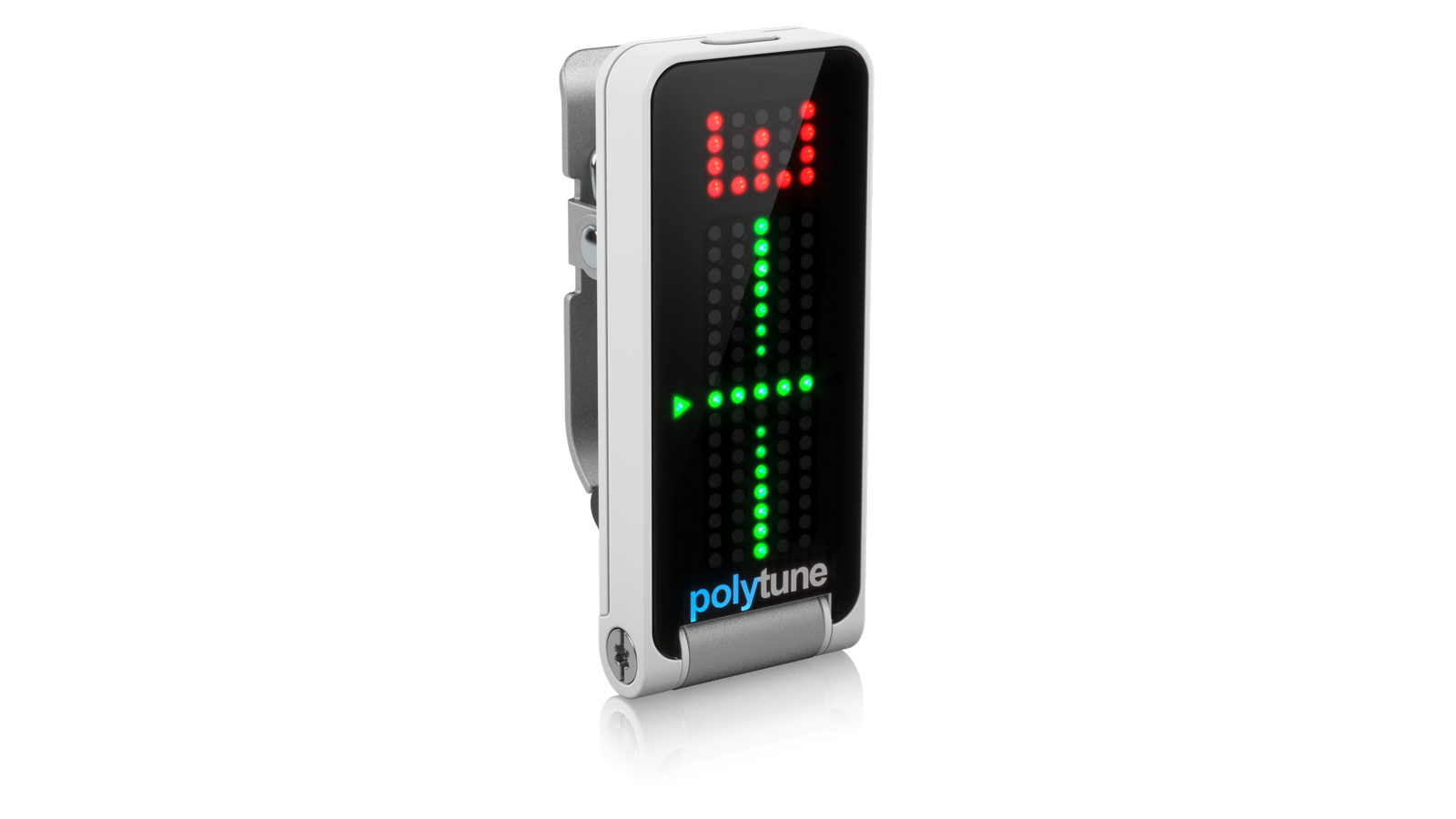
4. TC Electronic PolyTune Clip
Our expert review:
Specifications
Reasons to buy
Reasons to avoid
🎸 The PolyTune Clip delivers unrivaled accuracy for a clip on tuner, making it great for acoustic guitarists playing live.
✅ Buy if you want pedal accuracy in a clip-on: 0.02 cents is wildly accurate for a clip-on, and there aren’t many rack units or stompboxes that can rival this.
❌ Avoid if you have nitrocellulose finish guitars: The rubber clamps on this tuner may react with sensitive nitrocellulose lacquer on expensive guitars.
Overview: We'll make no bones about it – we're big fans of the TC Electronic PolyTune Clip. The pedal version of the PolyTune is a staple choice on just about every top ten list on the internet, so a clip-on version? Well – we're all ears.
Build Quality: As far as clip-on tuners go, the PolyTune Clip is built to last. TC Electronic has opted for a high-quality stainless steel clip that clamps down very reassuringly. The clip is also very wide, meaning you can use this on different styles of headstocks with ease. Although it utilizes rubber clamps, which can react with nitrocellulose lacquer, so be wary if you have expensive guitars in your collection.
Features: As the name suggests, it's a polyphonic tuner first and foremost – but with chromatic and strobe modes onboard as well, it's suitable for just about anybody. In one-note 'needle' mode, it'll even tune a bass guitar, as well as nearly every other string instrument.
Accuracy/Performance: While most clip-on tuners present a slightly looser approach to tuning accuracy, the PolyTune Clip proves that this doesn't always have to be the case. Boasting a staggering tuning accuracy of +/- 0.02 cents in strobe mode and 0.5 cents in chromatic mode, we can't help but want to buy one ourselves.
It's not a completely perfect tuner, though, if we're honest. It's big – much bigger than other clip-on tuners - and sometimes polyphonic mode can be a little buggy in loud environments. For home or solo playing, however? It's pretty spot on.
Best rack mount tuner
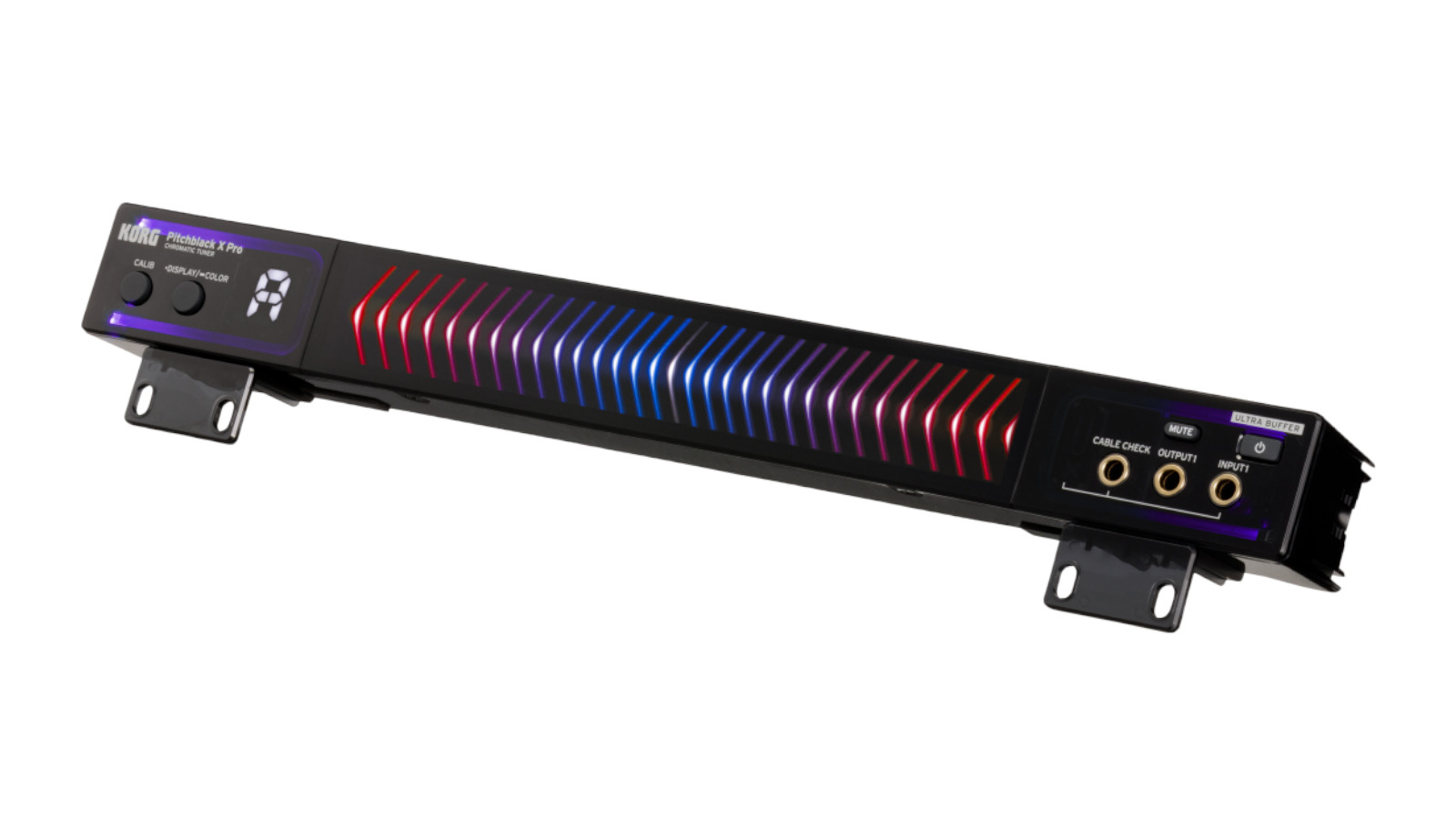
5. Korg Pitchblack X Pro
Our expert review:
Specifications
Reasons to buy
Reasons to avoid
🎸 This is a serious bit of kit for owners of home studios and those who are touring nationwide and internationally.
✅ Buy if you have a dedicated rack setup: This rackmount unit is ideal for a home studio, rehearsal space, or live rig where it can stay put and do its thing.
❌ Avoid if you need portability: It won’t squeeze onto your pedalboard or travel light, so look elsewhere if you’re after a compact, grab-and-go solution.
Overview: If you’ve been looking for a rack-mount tuner for your home studio or live setup, then look no further than the Korg Pitchblack X Pro. Like most Korg products, it’s incredibly sturdy, well-made, and, most importantly, incredibly accurate.
Build Quality: The Pitchblack X Pro is built with function and durability in mind, though it’s not the most premium-feeling rack gear on the market. The chassis is solid and well-assembled, but unlike some high-end rackmount units, it doesn’t feature an aluminum enclosure. That said, it still holds up well in the studio or live environments, with firm-feeling buttons and a display that remains visible from most angles. Whether mounted or sat on a desktop with the included feet, it feels stable and ready for serious use.
Features: Strobe mode can be quite divisive, so if it’s not your thing, there are also regular, mirror, and half-strobe modes. Although not the most portable on our list, the Pitchblack X Pro is battery-powered, so if your gigging rig is professional enough to feature rack-mounted effects, you can slot this in without taking up a plug space.
Accuracy/Performance: When in strobe mode, the Pitchblack X Pro is accurate to 0.1 cents, ideal if you’re about to lay down a track. More than any other tuner on our list, the Pitchblack X Pro’s display is massive, and the current version has more LEDs than the previous generation. Korg has designed this tuner with multiple situations in mind, as there are two levels of brightness. Whether you're on a dimly lit stage, in a studio, or performing at an outdoor gig, you’ll see your tuning with no issue.
Best budget option
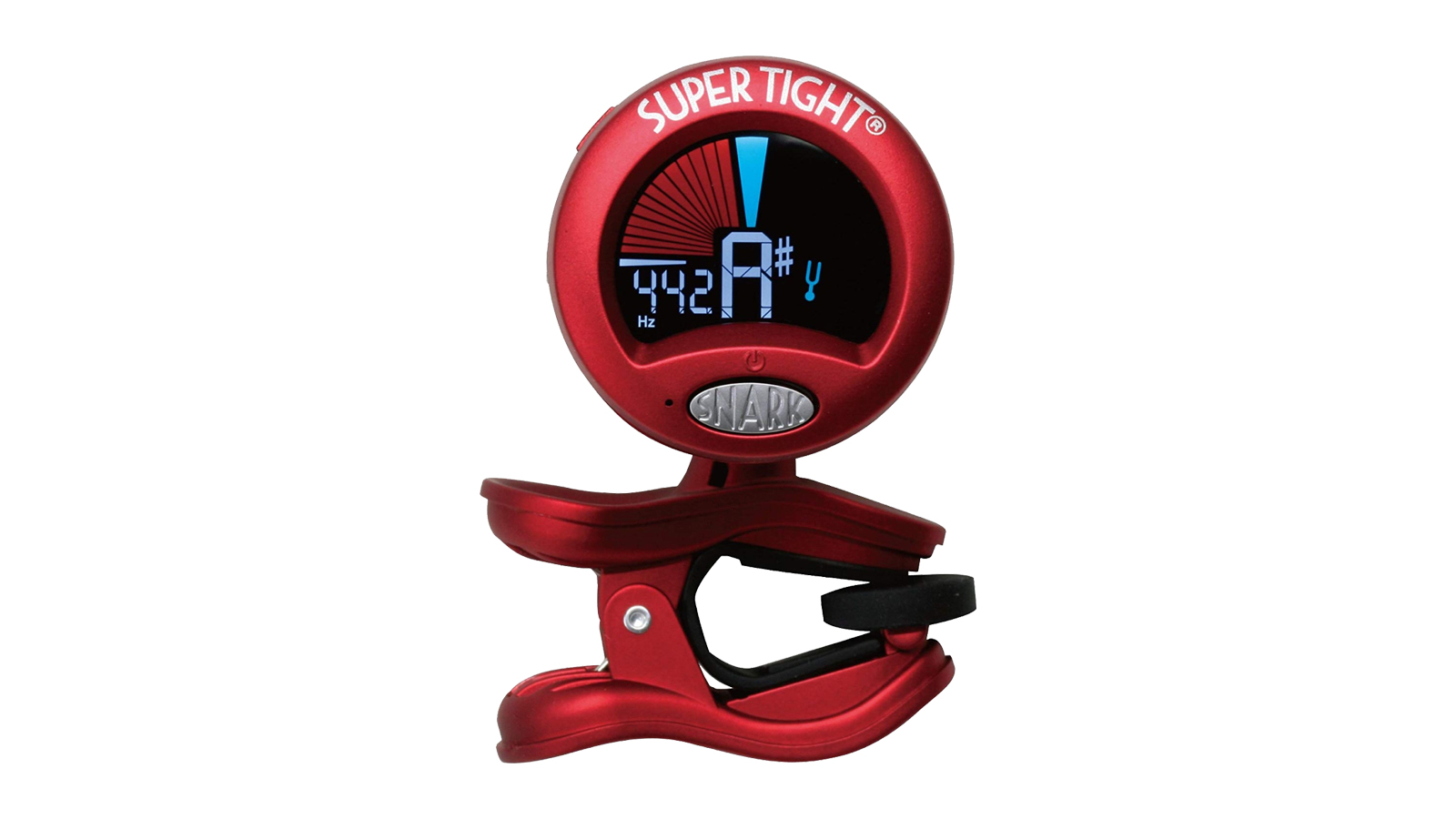
6. Snark ST-2 Super Tight
Our expert review:
Specifications
Reasons to buy
Reasons to avoid
🎸 Ideal for guitarists who want something cheap and cheerful for playing guitar at home.
✅ Buy if you want cheap and cheerful: The ST-2 isn’t flashy or the most accurate, but it does the job well enough to get you up and running.
❌ Avoid if you are going into the studio or gigging: You are better placed to go for a more accurate stompbox or rackmount tuner if you are laying down a track or playing shows.
Overview: A clip-on tuner is, in our opinion, a must-have for every traveling guitarist, beginner, or guitar teacher. Even if it never leaves your gig bag, an inexpensive tuner can provide you with some extra peace of mind, and this clip-on tuner – the Snark ST-2 Super Tight – is perhaps the perfect backup option.
Build Quality: The ST-2 Super Tight has, surprisingly, a super-tight grip that fits onto the headstock of virtually any stringed instrument. The bright and bold screen is very easy to read, and it sits on a rotational bearing that allows you to have it on the front and back of your headstock.
Features: Snark has decided to keep things simple with the ST-2, opting for a chromatic mode only. This is ideal for beginners, as the chromatic mode is what most people start with, thanks to its ease of understanding. Also ideal for beginners is the built-in tap-tempo metronome. Simply tap the BPM you need to practice, and it will spring into life, a neat feature on an otherwise simple tuner.
Accuracy/Performance: Using the vibration sensor or the microphone, it can pick up pretty much any signal you desire and help you tune quickly. While the vibration sensor can act in some pretty loud settings, the mic mode does require some peace and quiet for tuning acoustic instruments. Although Snark doesn’t specify the accuracy, I have used the ST-2 countless times, and it has always worked well for keeping me in tune to a reasonable degree. All in all, the ST-2 is a great all-rounder, and for the money? We can't complain at all.
Also consider
My six top picks should have most guitarists covered, but if you didn't find what you were looking for above, here are some more great options you can have a look at.
Boss TU-3
C0-C8 | +/- 1 cent | Chormatic, strobe modes
Not only is the TU-3 well built, but now with drop tuning functionality up to six semitones and improved tuning accuracy, I'd say that it's one of the best options for anyone who wants a bombproof pedal tuner at a reasonable price. While it isn't as completely feature-packed as some of the competition, we'd argue that the most important thing for a tuner is that it helps you accurately tune your guitar – and the TU-3 fulfills that brief.
★★★★½
Ernie Ball VPJR
+/- 0.1 cents | Chromatic mode only
This is a two-in-one volume and tuner pedal. The enhanced-definition touchscreen display will allow you to toggle between three modes: tuner, volume or volume and tuner. When you need to tune up, press the heel of the pedal all the way down, and it will cut your output and allow silent tuning. When the pedal is decompressed, the screen will switch to a graphic volume readout. Pretty clever right?
★★★★½
Fender Tune app
Auto tune, manual, chromatic modes
Fender's first-ever tuner app delivers an intuitive, simple, and easy-to-use tuner into the phones and hands of guitarists all over the world. It's available for both iOS and Android and makes it easier than ever before for newcomers to get their instruments in tune. It even covers topics such as strumming, setting up guitar amps, and basic tone tips.
★★★★☆
How to choose
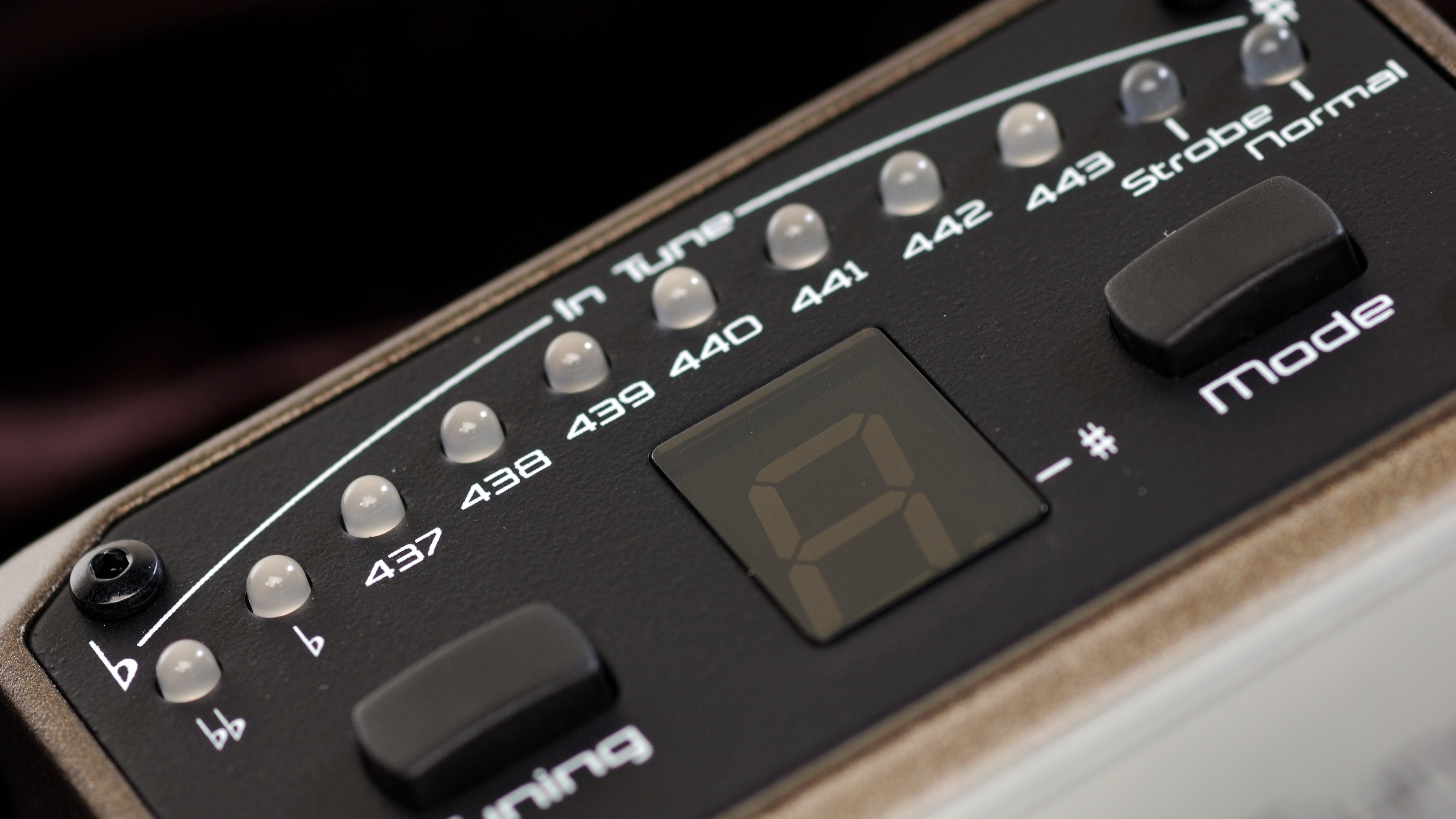
No matter how seasoned or new you are to the guitar, staying in tune is essential. It is not optional, it is imperative. A high-quality tuner is not a flashy addition to your setup, but it is arguably the most important one. And with so many options on the market, it is worth understanding what makes a tuner reliable, accurate, and right for your playing context.
1. Type
You can trust Guitar Player.
First, consider your environment. If you are a beginner taking guitar lessons, chances are, you are going to need a different tuner than someone touring the world in stadium rock shows. Once you consider your situation, this will inform you of the type of tuner that is best to go for.
Let us start with the most popular: pedal tuners. Chances are, most live performers and pedalboard users will be using a pedal tuner for various reasons. They are pretty affordable, built-to-last, most include useful features like a mute switch for silent tuning, bright displays and they often feature true or buffered bypass. They route your signal through a traditional jack input and offer fast, accurate tracking. If you are playing electric guitar regularly, are gigging, or just need something compact and accurate, a pedal tuner is a worthwhile investment.
Clip-on tuners remain a favorite for their convenience and ease of operation. These small tuners attach directly to your headstock and detect pitch via vibration. They are compact, battery-operated, and do not require cables, making them perfect for acoustic players or anyone practicing at home or in quieter environments. Clip-on tuners are an affordable and practical starting point for most players; thus, they are very popular with beginners.
Rackmount tuners serve a more specific purpose. Found most often in pro touring rigs, studios, or backlines, these units offer exceptional stability, detailed displays, and precision, but they also require a rack setup. Unless you are working in a studio or already running rack gear, a rackmount may be surplus to requirements.
2. Accuracy
Once you have decided on what pedal type to go for, then consider accuracy, since at the end of the day, you want your tuner to be as accurate as possible. Look at the specs: tuning accuracy is measured in cents, where 100 cents = one semitone. Higher-end pedal and strobe tuners often offer accuracy within +/- 0.1 cents or better. That level of precision is especially useful for recording, intonation, or alternate tunings. Clip-ons, while less precise, still offer enough accuracy for general use.
3. Modes
You will also notice that tuners offer different tuning modes. Chromatic tuners are the most common, detecting any of the 12 notes and supporting all tunings. Strobe tuners, considered among the most accurate, display pitch using a moving light and are favored for their sensitivity. Polyphonic tuners, like TC Electronic’s PolyTune, let you strum all six strings at once and quickly spot which strings are sharp or flat, a helpful tool on stage. Tuners like the Korg Pitchblack X Pro can offer a combination of all of these modes, whilst others will specialize in one, like the Peterson Strobostomp HD.
4. Price
The good news is that price is not a barrier to entry. Excellent clip-on tuners cost around $30, such as the PolyTune Clip, and robust pedal options can be had for under $100. Focus on reliability and format over features you might not use. The most important thing is having a tuner that fits your playing habits and keeps your tone honest.
FAQs
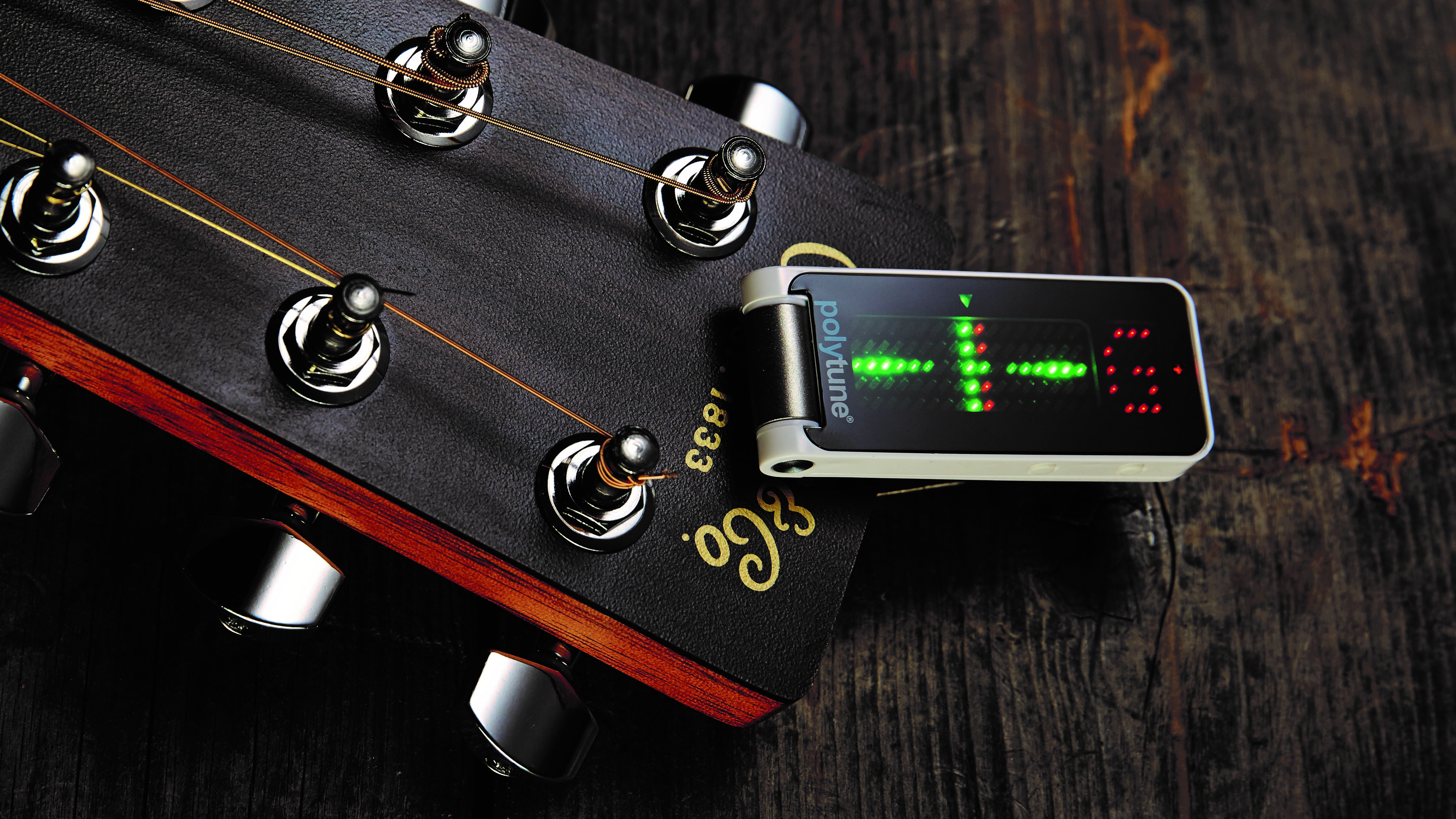
Do I need a dedicated tuner, or can I use a phone app?
Phone app tuners are a great development in the world of guitar, and could be perfect as a quick fix if you don’t have a tuner at all, or need a backup. I would suggest that you don’t rely on a phone tuner for live use as your phone microphone will pick up audio from elsewhere and may struggle to give you a clear indication of your tuning.
What types of tuners are there?
Nowadays, four types of tuners reign supreme: pedal, clip-on, rack, and app. I think each of these pedals has a place, and there may be a time when you want to own all of them – I currently have three of the four!
A pedal tuner is great for live, stuck onto your pedalboard and ready to be engaged at the push of a switch.
A clip-on tuner is ideal for home use and can pretty much stay clipped on to the top of your guitar’s head all the time, meaning it’s ready and waiting to provide you with perfect tuning advice.
A rack tuner is a more specialist piece of equipment that studio pros like to use. It’s not the kind of thing many players have at home, but they’re generally very accurate, which is essential for recording guitar.
App tuners are a more recent development, and something that every guitarist should have, meaning you can tune on the go, though they have the drawback of being impacted by external factors.
Other types of tuners are available, but these four are the most common and generally the styles I would recommend investing in.
How accurate should a guitar tuner be?
Any of the best guitar tuners will be very accurate, making sure you get imperceivably close to the exact frequency you are looking for. The best tuners will measure to a matter of a few cents away from the fundamental frequency you are looking for. The reality is that it’s almost impossible to be 100% accurate due to countless factors beyond a tuner’s control.
Can guitar tuners do alternate tunings?
Many tuners will have settings that allow you to tune to specific, non-standard tunings. This isn’t a standard feature on all tuners, however, and some will be set to tune to a specific frequency that is not related to what you are looking for, so make sure that you choose a tuner that has alternate tunings as an option.
Where should I place a guitar tuner pedal in my signal chain?
I always place my tuner as the first pedal in my signal chain. It provides a break between your guitar and the other pedals in your chain when engaged and ensures that the tuning is not impacted by other pedals; it only measures and shows your uncolored sound.
As the first pedal in the chain, you can engage it and still have other pedals active, for example, reverb or delay pedals can still decay, even when your tuner is active – if it is at the end of the chain, it cuts all sound.
Is there a big difference between a cheap and an expensive tuner?
I have used cheap clip-on tuners, mid-priced pedal tuners, and expensive rack-mounted tuners, and there is a clear difference in quality from the super-cheap to mid-priced; however, the difference between mid-priced and high-end becomes less obvious.
Cheaper tuners will generally do a job of getting you in tune, but you may find they are less accurate and less stable, jumping between notes seemingly randomly. Expensive tuners are far more accurate, with clear displays and rock-solid stability. If you are in need of a tuner at a bargain price, don’t worry, you should still manage to get your guitar in tune; however, I would recommend trying to stretch your budget to something in the mid-priced bracket if possible as you will undoubtedly have a better experience.
Do my strings and setup affect guitar tuning?
Setup can have a huge impact on tuning, with a bad setup contributing to poor tuning stability – so you’ll go out of tune quickly – and poor intonation – your guitar may not remain in tune the further you go up the neck. Always keep your guitar well-maintained with fresh strings and book in for regular setups (yearly is more than adequate for most players) to keep it in tip-top shape.
Will other noises affect my tuner?
A pedal tuner will be significantly less impacted by external noise factors.
A clip-on tuner is far more susceptible to other noises, particularly if you use an acoustic or hollowbody guitar, which will pick up more of those resonant frequencies. If you are using a clip-on in a live setting, you may find it is difficult to get an accurate reading on your tuner due to external noise.
You may also find that if you place a tuner pedal after any effects pedal, or try using a clip-on tuner while having pedals engaged, this could also provide issues for your tuner.
How to use a guitar tuner
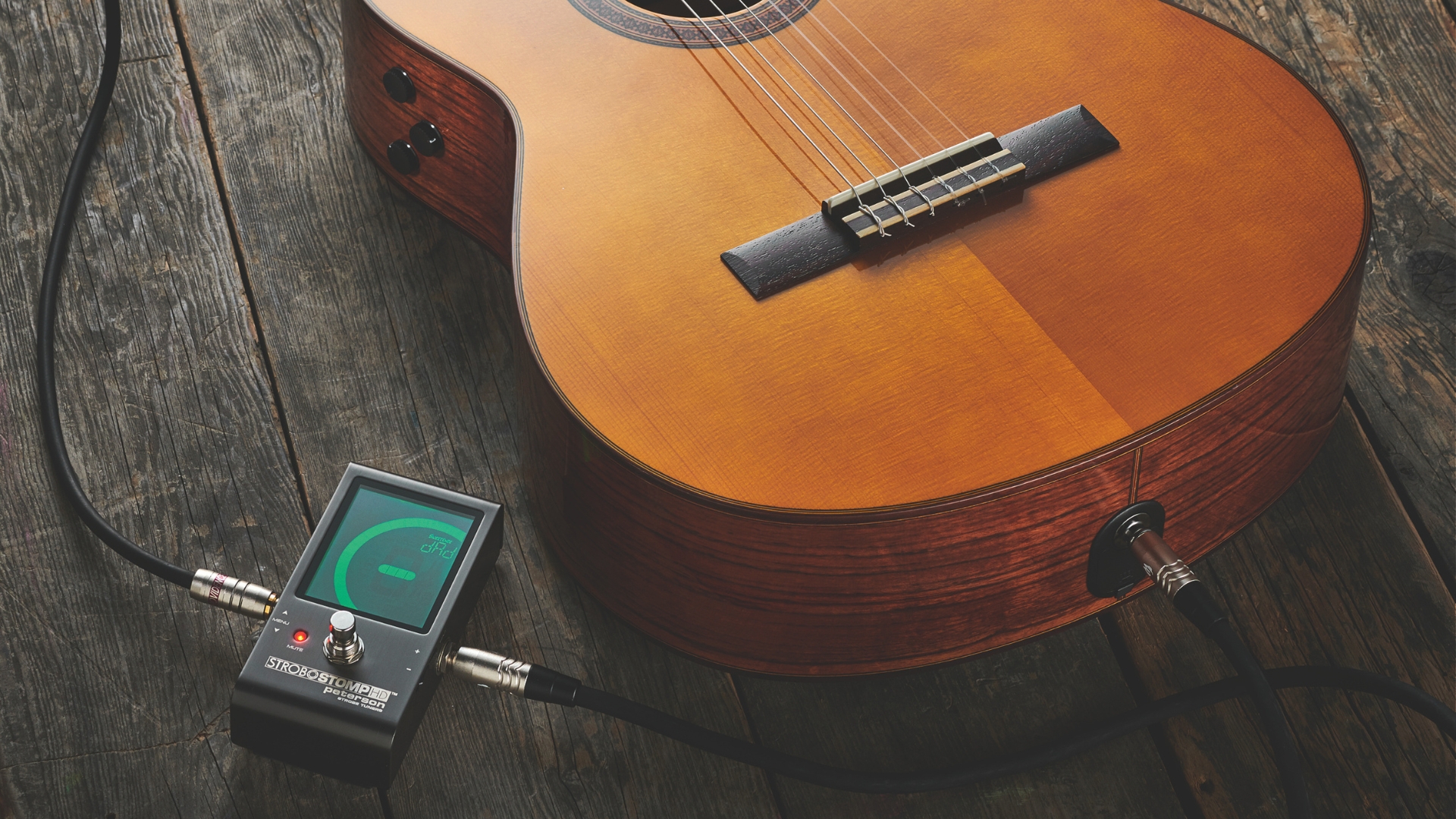
If you've never actually used a guitar tuner before, we can break this down into a few steps for you to get you going:
- 1. Engage the tuner: First up, get the tuner plugged in, clipped on, or the microphone in a prime place to hear your guitar and make sure it is turned on.
- 2. Pluck the string: Start from your lowest (i.e. the thickest) and pluck that one string independently and let it ring out.
- 3. Read the tuner screen: Look at the display to see what note is being played and if it's in tune.
- 4. Adjust the tuning peg: If the note is flat (too low) turn the corresponding tuning peg to raise the pitch until the tuner shows the correct note is in tune and do the opposite if the note is sharp (too high). I always go slightly below the correct note and then tune back up as this stabilizes the string tension.
- 5. Repeat for all strings: Work through all the strings in order of lowest in tone to highest.
- 6. Double check: Go back and check each string a second time. The tension on the neck will have shifted as you tuned other strings, so don’t assume everything will remain perfect, you may need to make some additional minor tweaks.
Key terms
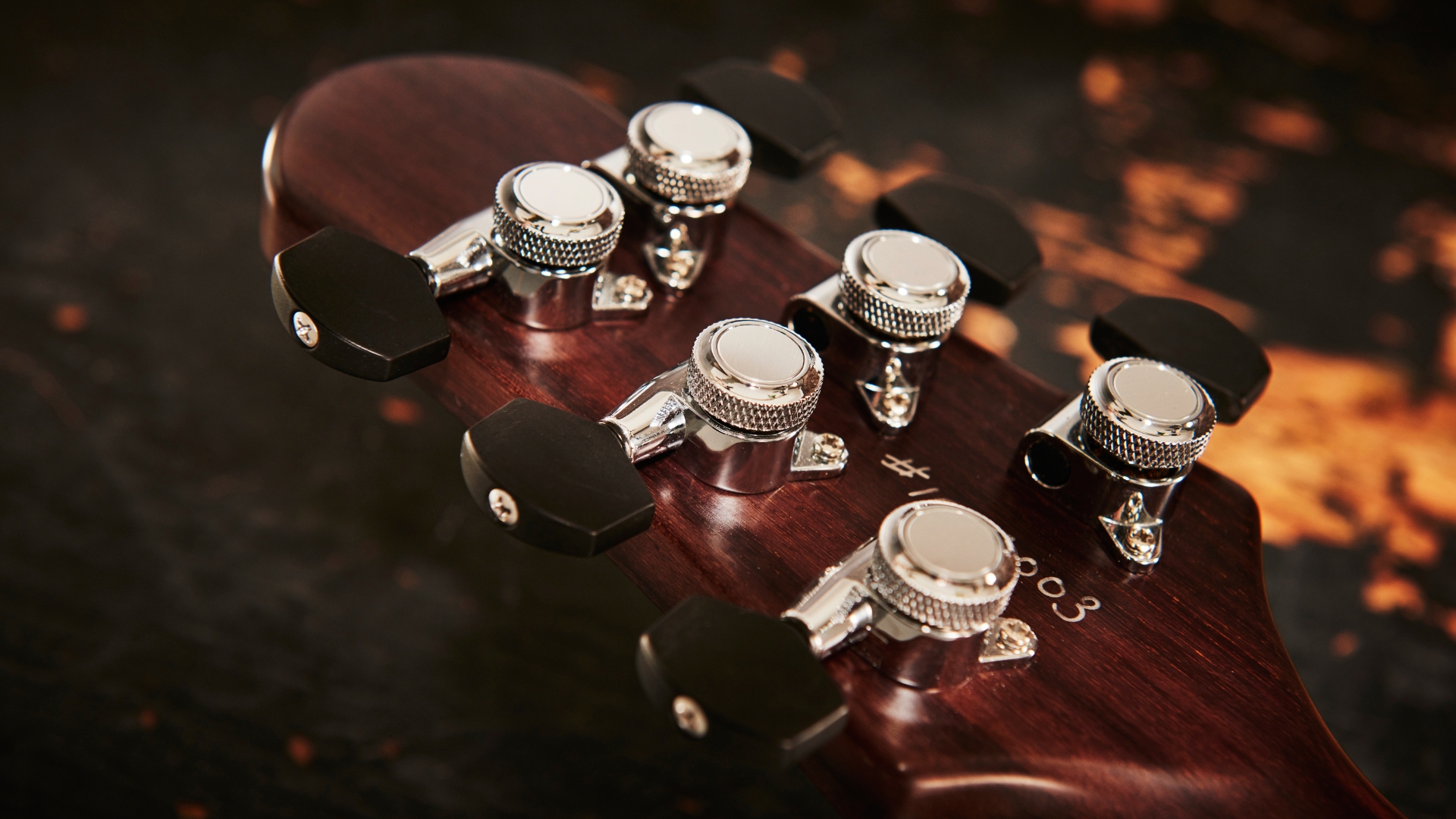
If you're struggling to understand some of the technical terms related to guitar tuners, then I've curated this glossary of key terms just for you. Here you'll find all the commonly used terms with clear descriptions of what they mean.
- 440Hz: This is the frequency that represents the international standard for tuning. Also known as A4, it refers to the A note above middle C.
- Accuracy: How closely your tuner reads the tone and provides the correct reading. The more accurate the tuner, the more accurate your tuning will be.
- Alternate tuning: Any tuning other than standard (EADGBE). This may not be read perfectly by tuners without alternative tuning modes.
- Buffered bypass: A pedal where a buffer circuit is always active, even when the pedal is off. This helps negate top-end loss in long signal chains.
- Calibration: On each tuner, you can set the calibration to recognize a particular frequency. The Standard is 440Hz, but tuners can be calibrated to others like 432Hz or 447Hz
- Cents: A unit of measurement equal to one-hundredth of a semitone, or one-hundredth of a fret.
- Chromatic tuner: The most popular type, a chromatic tuner can detect all 12 notes in the chromatic scale, allowing tuning for any pitch.
- Downtuning: The process of tuning all the strings on a guitar down to a lower pitch than standard tuning
- Flat & sharp: Simply put, if your pitch is flat, it is lower than the desired note. If it is sharp, then it is too high in pitch.
- Frequency: Measured in Hertz (Hz), frequency is the number of sound wave vibrations per second, which determines the note that a guitar plays.
- Headstock: The top of the guitar, where the tuning pegs sit and atop which clip-on tuners are clipped as vibrations travel through the neck to here.
- Intonation: Intonation refers to how in tune the guitar is across the entire length of the string. A guitar can be in tune when you play an open note, but out of tune further up the neck due to the way it is set up.
- Pedal tuner: This type of tuner is a floor-based unit that is activated by a footswitch. They typically have bright displays and are very accurate.
- Polyphonic tuner: A polyphonic tuner is one that allows you to strum all six strings at once, and it will show you a visual representation of whether you are in tune or not.
- Signal chain: The order that your signal flows from your guitar to the output, generally an amplifier. The bits in the middle will generally include cables and pedals.
- Strobe tuner: This type of tuner is very accurate and uses a spinning light to show pitch changes. When the spinning strobe light stops, you will be in tune.
- Tuning up: The process of tuning all the strings on a guitar up to a higher pitch than standard tuning
- True bypass: The tone purists’ favorite, this is a signal transfer that doesn’t color your guitar tone whatsoever. When your signal passes through, the sound won’t be affected.
How we test
At Guitar Player, our team of seasoned writers comprises devoted musicians deeply entrenched in the wide world of music. With years of playing and rigorous product testing, we bring a wealth of practical knowledge derived from real-world experiences with musical equipment. Our dedication spans every chapter of life as a msucian, from early rehearsals to full-on tours, forming the foundation for our discerningly curated recommendations across various categories.
When it comes to pinpointing the best guitar tuners, our approach is thorough. We integrate practical experience, insights garnered from user reviews, and in-depth discussions within our editorial team. This meticulous process ensures a nuanced evaluation, providing a reliable guide tailored for those seeking precision tuning solutions.
As passionate guitarists ourselves, our primary mission is to guide fellow players in discovering gear that perfectly aligns with their needs. We meticulously consider factors such as accuracy, ease of use, and durability to compile a list that authentically represents the best guitar tuners in today's musical landscape.
Latest updates
07/01/26: The guide has had the introduction refreshed, as well as a new header image for a fresh look. Each product entry has had a 'Who it's for' boxout added to help guide readers better. The FAQs and key terms sections have had a significant overhaul, and a fresh section titled 'how to use a guitar tuner' has been added.
Related buying guides
- On a budget? These are the best Epiphone Les Pauls
- And these are the best electric guitars under $1,000
- For the Fender enthusiasts, these are the best Stratocasters
- Plug in to one of the best tube amps
- Or use one of the best multi-effects pedals
- You'll need some of the best electric guitar strings
- And some of the best acoustic guitar strings too
All the latest guitar news, interviews, lessons, reviews, deals and more, direct to your inbox!

Matt is a Junior Deals Writer here at Guitar Player. He regularly tests and reviews music gear with a focus on guitars, amps, pedals, modelers, and pretty much anything else guitar-related. Matt worked in music retail for 5 years at Dawsons Music and Northwest Guitars and has written for many music sites, including MusicRadar, Guitar World, Guitar.com, Ultimate Guitar, and Thomann’s t.blog. When not writing for Guitar Player, you'll find him making a racket with northern noise punks Never Better.
